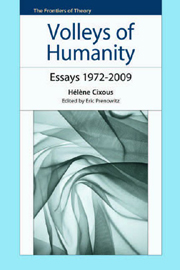Book contents
- Frontmatter
- Contents
- Sources
- Series Editor's Preface
- Introduction: Cixousian Gambols
- 1 Fiction and Its Phantoms: A Reading of Freud's Das Unheimliche (The ‘Uncanny’)
- 2 The Character of ‘Character’
- 3 Missexuality: Where Come I Play?
- 4 The Pleasure Reinciple or Paradox Lost
- 5 Reaching the Point of Wheat, or A Portrait of the Artist as a Maturing Woman
- 6 Letter to Zohra Drif
- 7 The Names of Oran
- 8 The Book as One of Its Own Characters
- 9 How Not to Speak of Algeria
- 10 The Oklahoma Nature Theater Is Recruiting
- 11 The Book I Don't Write
- 12 The Unforeseeable
- 13 Passion Michel Foucault
- 14 Promised Cities
- 15 Volleys of Humanity
- Acknowledgements
- Index
1 - Fiction and Its Phantoms: A Reading of Freud's Das Unheimliche (The ‘Uncanny’)
Published online by Cambridge University Press: 12 September 2012
- Frontmatter
- Contents
- Sources
- Series Editor's Preface
- Introduction: Cixousian Gambols
- 1 Fiction and Its Phantoms: A Reading of Freud's Das Unheimliche (The ‘Uncanny’)
- 2 The Character of ‘Character’
- 3 Missexuality: Where Come I Play?
- 4 The Pleasure Reinciple or Paradox Lost
- 5 Reaching the Point of Wheat, or A Portrait of the Artist as a Maturing Woman
- 6 Letter to Zohra Drif
- 7 The Names of Oran
- 8 The Book as One of Its Own Characters
- 9 How Not to Speak of Algeria
- 10 The Oklahoma Nature Theater Is Recruiting
- 11 The Book I Don't Write
- 12 The Unforeseeable
- 13 Passion Michel Foucault
- 14 Promised Cities
- 15 Volleys of Humanity
- Acknowledgements
- Index
Summary
Let us propose here a bifurcated reading, between literature and psychoanalysis, with double attention paid to what is produced and what escapes in the unfolding of the text, sometimes led by Freud and at other times bypassing him in this trajectory that strikes us to be less a discourse than a strange theoretical novel. There is something ‘savage’ in the Unheimliche, a breath or a provocative air which at times catches the author himself off guard, overtaking him and restraining him. Freud and the object of his desire (i.e. the truth about the Unheimliche) are fired by reciprocal inspiration. This long essay by Freud is a text of uncertainty: a tightly woven net that strangely inscribes a system of anxieties [inquiétudes] in order to track down the concept das Unheimliche, the disquieting strangeness, the uncanny. Nothing turns out less reassuring for the reader than this niggling, cautious, yet wily and interminable pursuit (of ‘something’ – be it a domain, an emotional movement, a concept, impossible to determine and variable in its form, intensity, quality, and content). Nor does anything prove to be more fleeting than this search whose movement constitutes the labyrinth which instigates it; the sense of strangeness imposes its secret necessity everywhere. The movement's progress is all-enveloping and its contradictory operation is accomplished by the author's double: Hesitation. We are faced with a text and its hesitating shadow, and their double escapade.
- Type
- Chapter
- Information
- Volleys of HumanityEssays 1972–2009, pp. 15 - 40Publisher: Edinburgh University PressPrint publication year: 2011



